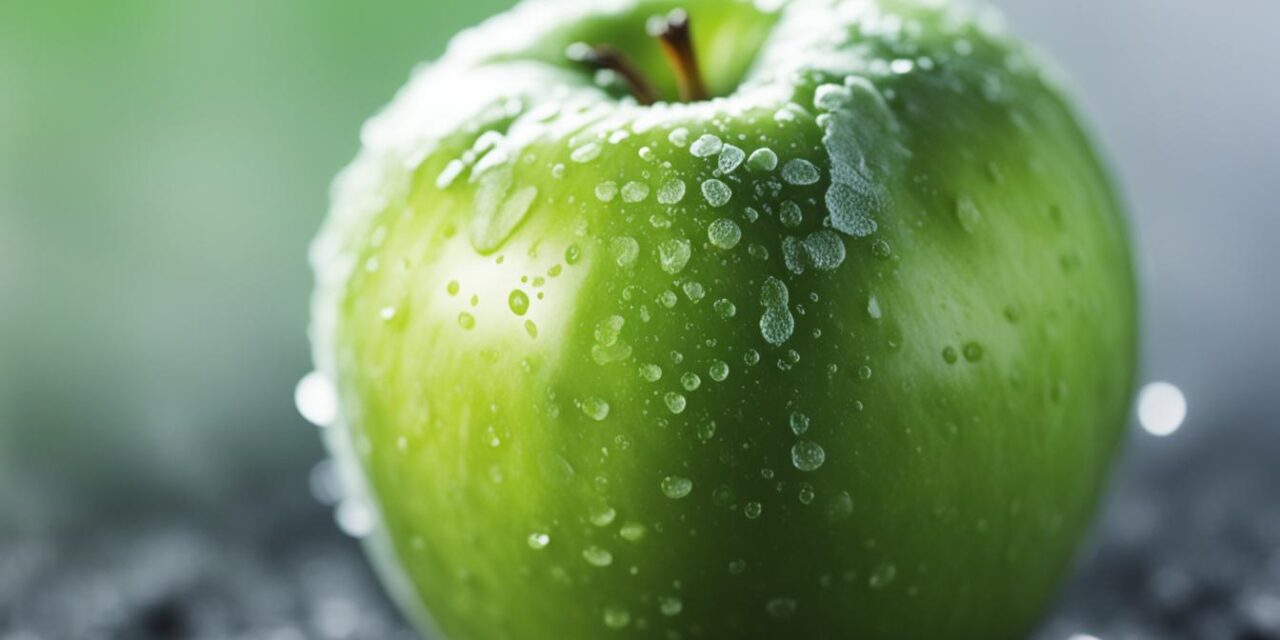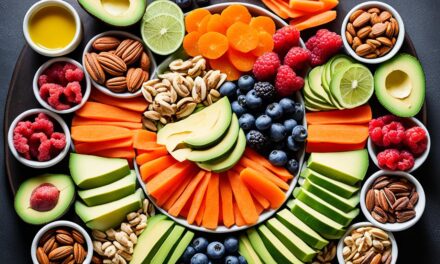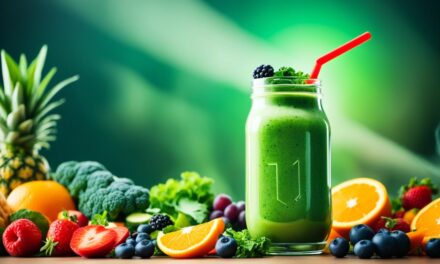Did you know that nearly 75 percent of non-organic fresh produce sold in the U.S. contains residues of potentially harmful pesticides? According to EWG’s 2023 Shopper’s Guide to Pesticides in Produce™, this alarming statistic reveals the widespread presence of pesticide-laden foods in our daily diets. These pesticides can have significant impacts on both our health and the environment.
Key Takeaways:
- Approximately 75 percent of non-organic fresh produce in the U.S. contains pesticide residues.
- Blueberries and green beans have recently been added to the Dirty Dozen list of fruits and vegetables with the highest pesticide traces.
- Pesticide-laden foods have detrimental effects on the environment, including soil and water contamination and air pollution.
- Scientific studies have linked pesticide exposure to health risks, such as birth defects and developmental disabilities.
- Choosing organic produce and washing fruits and vegetables thoroughly can help minimize pesticide exposure.
The Environmental Impact of Pesticide-Laden Foods
Pesticide-laden foods not only pose risks to our health but also have a significant impact on the environment. The use of pesticides in conventional farming practices can have far-reaching consequences that stretch beyond the boundaries of the farm.
Soil and water contamination: Pesticides used in agricultural activities can seep into the soil and contaminate groundwater, leading to long-term damage to soil quality and affecting the delicate balance of ecosystems. This contamination can persist for years, posing a threat to plant and animal life that depend on these resources.
Ecosystem disruption: The toxic chemicals present in pesticides can harm beneficial insects, birds, and other wildlife, disrupting natural ecosystems. Pesticides have been known to harm pollinators like bees, which play a crucial role in the reproduction of many plants. The loss of these important species can have far-reaching consequences for the stability and biodiversity of our ecosystems.
Air pollution and greenhouse gas emissions: The use of pesticides in farming can contribute to air pollution and greenhouse gas emissions, further exacerbating the environmental impact. Volatile organic compounds (VOCs) released from pesticides can contribute to air pollution, while the production and transportation of these chemicals result in greenhouse gas emissions that contribute to climate change.
Health risks: The residues of pesticides used on crops can persist on the fruits and vegetables we consume, posing health risks to humans. Exposure to pesticide residues has been linked to various health issues, including adverse effects on the nervous system and an increased risk of certain cancers.
By understanding the environmental impact of pesticide-laden foods, we can make more informed choices to reduce our exposure to harmful substances and promote sustainable farming practices. Choosing organic produce and supporting farmers who employ environmentally friendly farming methods can help minimize the negative effects on our health and the planet.
The importance of sustainable farming practices
“Sustainable farming practices are not only essential for preserving the environment but also for safeguarding our health and the well-being of future generations.” – Dr. Rachel Thompson, Environmental Scientist
Transitioning to sustainable farming practices, such as organic farming, can provide a solution to mitigate the environmental impact of pesticides. Organic farming methods prioritize soil health, biodiversity, and natural pest control, reducing the reliance on synthetic chemicals.
Organic farmers employ techniques like crop rotation, companion planting, and the use of natural pest predators to manage pests and diseases without relying on harmful pesticides. These sustainable practices promote soil fertility, conserve water, and protect the delicate balance of ecosystems.
In addition to choosing organic produce, it is crucial to support local farmers who may adhere to organic practices but have not obtained organic certification due to cost constraints. Building relationships with farmers and learning about their farming practices can help us make more sustainable and environmentally conscious choices.
By understanding the environmental impact of pesticide-laden foods and supporting sustainable farming practices, we can contribute to a healthier planet and a more sustainable future.
The Health Risks of Pesticide Exposure
Did you know that pesticide residue on fruits and vegetables can pose serious health risks? Peer-reviewed scientific studies have uncovered alarming connections between pesticide exposure and various health issues. From an increased risk of birth defects to developmental disabilities in children, pesticides have the potential to harm the human body in alarming ways. Research conducted by Harvard University even suggests that consuming produce with high levels of pesticide residues may lessen the health benefits typically associated with these foods, such as protection against cardiovascular disease.
“Pesticide residue on fruits and vegetables can have detrimental effects on our health. It’s important to be aware of the potential risks and take steps to minimize exposure.”
The American Academy of Pediatrics shares concerns about pesticide exposure in children, recommending parents refer to the EWG’s Shopper’s Guide for guidance. This serves as a valuable resource for parents who want to ensure their children are not excessively exposed to pesticides.
To give you a better understanding of the health risks posed by pesticide residue, here is a visual representation of the key findings:
| Pesticide Exposure | Health Risks |
|---|---|
| Increased risk of birth defects | Increase in developmental disabilities |
| Potential harm to the human nervous system | Reduction in health benefits associated with fruits and vegetables |
As seen above, pesticide exposure can have detrimental effects on human health, spanning from birth defects to potential harm to the nervous system. Furthermore, it underscores the importance of being cautious about the food we consume and the potential risks associated with pesticide residue.
How to Buy Clean: Choosing Organic and Minimizing Exposure
When it comes to healthy eating, choosing clean, organic produce is essential. Organic farming practices prioritize your well-being by prohibiting the use of synthetic pesticides, making organic fruits and vegetables a safer choice for you and the environment. By opting for organic options, you can significantly reduce your exposure to harmful pesticide residues found in conventional produce.
The 2023 Shopper’s Guide recommends buying organic versions of the Dirty Dozen items whenever possible. These are the fruits and vegetables that have been found to have the highest traces of pesticides. Let’s take a closer look at the Dirty Dozen:
| Dirty Dozen | Organic Alternatives |
|---|---|
| 1. Apples | Organic apples |
| 2. Strawberries | Organic strawberries |
| 3. Grapes | Organic grapes |
| 4. Peaches | Organic peaches |
| 5. Cherries | Organic cherries |
| 6. Pears | Organic pears |
| 7. Tomatoes | Organic tomatoes |
| 8. Celery | Organic celery |
| 9. Potatoes | Organic potatoes |
| 10. Bell peppers | Organic bell peppers |
| 11. Nectarines | Organic nectarines |
| 12. Spinach | Organic spinach |
However, it’s important to recognize that smaller farms may practice organic methods without obtaining official certification due to financial constraints. Building relationships with local farmers and learning about their farming practices can help you make informed decisions and support responsible growers who prioritize your health.
Moreover, while buying organic produce reduces your exposure to pesticide residues, it’s crucial to remember that washing your fruits and vegetables thoroughly is also important. This practice can help remove some pesticide residues, although it may not eliminate them entirely.
By adopting a mindful approach to healthy eating and choosing organic options, you can prioritize your well-being and contribute to a healthier planet. Let’s continue our journey to discover the importance of healthy eating and how it impacts our lives.
Conclusion
When it comes to healthy eating, it’s crucial to make informed choices about the fruits and vegetables you consume. The 2023 Shopper’s Guide provides valuable insights into the impact of pesticides on both human health and the environment.
While pesticides have been linked to detrimental effects, it’s important to remember that a balanced diet that incorporates a variety of fruits and vegetables is essential for overall well-being. Whether organic or not, these nutrient-rich foods offer numerous health benefits.
By referring to the Dirty Dozen and Clean Fifteen lists, you can prioritize organic options for produce with higher pesticide residues and choose conventional options for those with lower residues. Additionally, building relationships with local farmers and understanding their farming practices can help you make more informed decisions about the food you eat.
Ultimately, adopting a mindful approach to healthy eating that takes into account the presence of pesticide residues can contribute to your overall well-being. So, remember to consider the 2023 Shopper’s Guide and choose your fruits and vegetables wisely!
FAQ
Which fruits and vegetables are considered the Dirty Dozen, and why?
What are the Clean Fifteen, and why are they considered safer?
Is organic produce the only safe option to avoid pesticide residues?
How can I minimize pesticide exposure when consuming fruits and vegetables?
Are the health benefits of consuming fruits and vegetables compromised by pesticide residues?
MORE SOURCES TO READ:
- https://www.ewg.org/foodnews/summary.php
- https://www.cnbc.com/2023/03/29/dirty-dozen-2023-12-fruits-and-vegetables-with-the-most-pesticides.html
- https://www.elizabethrider.com/dirty-dozen-clean-15/
![]()














Recent Comments